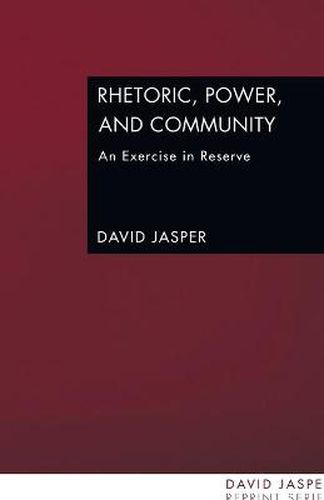Readings Newsletter
Become a Readings Member to make your shopping experience even easier.
Sign in or sign up for free!
You’re not far away from qualifying for FREE standard shipping within Australia
You’ve qualified for FREE standard shipping within Australia
The cart is loading…






Rhetoric has returned vigorously to the agenda of a number of academic disciplines. Aristotle defended the art of rhetoric, while Plato was suspicious of its manipulative power to persuade. This study examines rhetoric in the context of different kinds of religious texts, from sacred scripture, to liturgy, to contemporary and postmodern writing and religion. How does the believing community negotiate rhetorical power-games which may be exercised upon it, and do we have to be bold to see the ironies and the joke which may be played upon us in the name of the truth of religion? This book is an exercise in rhetoric which is itself suspicious of the rhetorical arts. Its concerns are profoundly theological, though perhaps offensive to theology as it is often practiced in the church and the academy. It offers no conclusion, but perhaps a way of exploring and of looking afresh.
$9.00 standard shipping within Australia
FREE standard shipping within Australia for orders over $100.00
Express & International shipping calculated at checkout
Rhetoric has returned vigorously to the agenda of a number of academic disciplines. Aristotle defended the art of rhetoric, while Plato was suspicious of its manipulative power to persuade. This study examines rhetoric in the context of different kinds of religious texts, from sacred scripture, to liturgy, to contemporary and postmodern writing and religion. How does the believing community negotiate rhetorical power-games which may be exercised upon it, and do we have to be bold to see the ironies and the joke which may be played upon us in the name of the truth of religion? This book is an exercise in rhetoric which is itself suspicious of the rhetorical arts. Its concerns are profoundly theological, though perhaps offensive to theology as it is often practiced in the church and the academy. It offers no conclusion, but perhaps a way of exploring and of looking afresh.